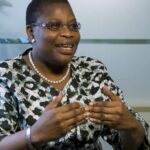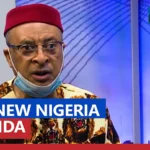A COCKROACH OF MANY SEASONS by Pat Utomi
I read with much appreciation and delight Festus Adedayo’s column on Abati and Davido as Cockroaches.
I do not know how they did it but the Nigerian Tribune is justifying its longevity by giving our country the gift of great columnists. Every week I read with a sense of satisfaction these Tribune Columnists and feel grateful that the grand era of the Newspaper column has yet to evaporate. Peter Pan, Sad Sam, Ayekoto etc. brought light to darkness. The Tribune columnists flood this present darkness with exhilaration like the experience of the floodlights of Liberty Stadium, Ibadan, which brought us excitement as children in the 1960s.
But I respond to Festus Adedayo’s thoughtfulness in that piece not as a once upon a time columnist myself but as a worried citizen on the one hand and as a social scientist concerned about the State in post colonial Africa, especially about how the nature of that state prolongs the misery of the poor and vulnerable, and how the world views Africa.
Identity politics and ethnic baiting captured in the metaphors of Cockroaches and ‘cut down the tall trees’ in the run up to Rwanda’s genocide are in my view the result of leadership failure.
Why did America become a melting pot and divisive politics make Africa a poster child of state failure?
One Ronald Reagan video tells that story well. The story of American exceptionalism and the blending in. The US journey may not be perfect but that First new nation teaches plenty.
The so called Igbo/Yoruba divide building up, as Adedayo points out, with possibilities of terrible foreboding yet to be fully appreciated by their champions, is a classic example.
I would like to speak to that as one who has been a cockroach in many seasons.
For one born in Kaduna, baptized in Jos, started school in Kano, witnessed the pogrom in Gusau in 1966, and part of the civil war, including the civilian massacres in Asaba in 1967 and 1968, I only got sensitive to the cockroach syndrome as an undergraduate at UNN in 1973/74.
My horrific war experience did not raise my sensitivity as much as the experience of 1974. May be becoming more mature made that so.
Seeing all of the other four universities in Nigeria at the time shut down from protests on the anniversary of the Kunle Adepeju killing by police at UI, I became part of a group that challenged the SUG, calling for action to identify with undergraduates across the country.
A few students, understandably distraught that they lost three years during the war, while colleagues at Unilag, UI, Ife and ABU carried on with their studies, shouted at me ‘you Yoruba boy go and read your book’.
I was not a Yoruba boy. But I thought of myself as a citizen who placed a premium on human solidarity.
Even with the wounds of the civil war then so fresh, the typecasting of people on ethnic lines was nowhere as horrible as it is today.
Surely my group of friends on campus at Nsukka, which included people like Folu Ayeni the 1975 valedictorian at UNN, who many years later founded the fast food chain, Tantalizers, with his wife, Bose, my classmate from High School in Loyola College Ibadan, Gbenga Sadipe, Idiat Adesanya, Ronke Ashaye and even current NAFDAC DG Prof Moji Adeyeye,, may suggest broader affiliation. That they were in the circle I spent much time with did not alter my DNA.
The company did not make me Yoruba. Clearly not. But the experience points to the danger of typecasting people.
Twenty years later the elections of June 12 got annulled. With no thought to the ethnicity of Chief MKO Abiola I rallied professionals with an OpEd piece: We must say Never Again. It was published in the Guardian.
Public court records suggest I survived two assassination attempts for the effort of the Concerned Professionals to fight for overturning the annulment. This was in addition to facing police assault during street demonstrations. The one at St Peters Church on Ajele street was well reported in the Vanguard which wrote that I lost my glasses.
I was at that time a COO of a multinational manufacturing company. In my autobiography: To Serve is To Live, I wrote about how Alex Ibru, the Guardian publisher could not comprehend the audacity of someone in my position standing up so stoutly for what he believed in.
Years later I was chatting with a young CEO of a multinational from my part of the country on an unrelated subject when he remarked that he was a final year student in the University when the CP protests took place. He said he was put off by the fact that of the 39 of us that signed a published petition only myself and two or three others were not Yorubas.
I had no recollection of how many signed the petition nor had I ever given thought to the ethnicity mix of the protestors.
Many years later my classmate from Nsukka , Femi Kusa, wrote a vitriolic bashing of Igbos. I responded with an expression of my surprise at what I thought was uncharitable ethnic bashing and wondered what was done wrong that a person who should be an ambassador for Igbo openness would feel that way. Just like American graduate education did much to affect understanding of the American way I had hoped a UNN education would have helped Femi better appreciate Ndigbo and said so in that response.
That episode alarmed me to the nature of the poison being concocted.
From my work in political economy I have celebrated what American political scientists Robert Melson and Howard Wolpe called competitive communalism in which ethnic nationality groups competed on who would most bring progress to their regions at the birth of of self government in Nigeria.
It required political leadership to continue to harvest the benefits of Federalism and the competition doctrine without spilling into debilitating dislike for people of other ethnic nationality groups. Instead politicians exploited the diversity that should have been strength in a way that it became not just a weakness, but an albatross, weighing down progress.
I became acutely sensitive to the fact that political actors were exploiting the emotions of identity politics. This was getting so divisive I feared it would make for a narrative that would make Nigeria unattractive for investment for both Nigerians of some disposition to risk. and foreigners.
Opportunities to do something about my concerns kept coming.
When the Oba of Lagos was said to threaten to drown Igbos in the Atlantic, if they did not act a certain way with their vote and opinions went wild I called for calm saying the Oba had no tools to effect such a threat but was probably joking as he often did.
A few Igbo business men said to me that my intervention calmed nerves and nipped over reaction in the bud. On one visit to the Oba in his palace his daughter reminded him how she told him I saved the day.
During another season the Reverend Ladi Thompson came to see me to proselytize his initiative on bringing Igbo and Yoruba elite together to discuss and shake hands. I told him I was chair of the board of trustees of Nzuko Umunna which had organized the Handshake across the Niger summit which brought many Yoruba leaders to Enugu for the first time. His ideas were in tandem and music to my ears.
I accepted Thompson’s invitation to host the YIGBA meeting at my home in Lagos. And the heavy weights came. From the Yoruba side they included Ptof S. Banji Akintoye, former Secretary of UPN and leader of the Yoruba Nation, Chief Ayo Adebanjo of Afrnifere, Dr Christopher Kolade and dozens of other Yoruba prominent people. From the Igbo side came past and future presidents of Ohaneze like Prof Joe Irukwu and Prof George Obiozor, General Ike Nwachukwu and dozens more.
Prof Akintoye set the tone of the conversation by recalling a visit to Chief Obafemi Awolowo just before he passed. He said Chief Awolowo lamented that he did not manage to fix the Yoruba/Igbo rift and that he then charged both him and Chief Olaninwon Ajayi to make that bridging project top priority.
On my part I invited the Distiguished submitters to try reading Jared Diamond on the evolution of human civilization and migration in man’s birth place in Africa. I assured them they would find the Igbos and Yorubas were close cousins and words like those which identify body parts, as language developed, before some migrated further East on the West African coastline would be similar. So the fact that imi in Igbo is imu in Yoruba, enu in Yoruba is onu in Igbo and eti is nti should make these cousins better behaved towards each other.
So how did we get here that me, the ‘Yoruba boy’ of yesterday receives a storm of insults from people who have either not read what I have written or interpreted every word from the prism of their bias because they identify me as Igbo.
When I listened to a senior US diplomat who monitored the elections in Lagos in March of 2023 recount his observations and being traumatized by forceful, often quite violent effort to prevent Igbos from voting, two emotions flowed through. One was to think of Dr Michael Okpara and the details of his support for Adegbenro and company during the elections in Western Region in 1965 and of my own half a century of bridging effort. I had been closely associated with an Adegbenro for decades and had heard great details of Okpara relocating to the South West to personally boost the effort of the Awo loyalists.
I decided my time of being verged on waste. All these because a few desire power no matter the cost for sustained social advance, the peace of a people and history’s judgement.
I realize this is not a uniquely Nigerian problem. Jurgen Habermas finds democracy and modernity to converge around rational public conversation but the philosopher of the public sphere can probably see how politicians play emotion in many countries, giving people like Joshua Greene at the Center for Moral Cognition at Harvard much to study about ‘ emotion, reason and the gap between us and them.
Last month I participated in part of the Rwanda Genocide conference at California State University in Sacramento. As I bantered with the Atorney-General of Rwanda I could not but wonder why politicians have not thought it proper to call off the people they have unleashed on social media to spread hate.
The moment took me back to why I founded the Centre for Values in Leadership in 2004.
Persuaded that values shape human progress and that leadership set the tone of culture I wanted a place of convergence of knowledge on these matters, a practical show of examples through role models, and their interaction with people.
I then set up CVL. I already tried to build a network of promising young professionals in their 20s I could try to influence directly on the import of values. One day I invited 12 of them to lunch. That group would yield impactful lives like Fela Durotoye, Niyi Adesanya, FEB Idahosa, Linus Okorie, Ubong Essien Gbenga Sesan, Lanre Olusola and others. They were followed by the Chude Jideonwos and Debola Williamses, and Nasser Sidi Ali who I offered my shoulders to stand on.
The younger ones who would be part of the early CVL club as undergraduates include Bimbo Olatunji, and Tolu Ademujimi who has been writing books on each of Ghandi’s 7 Deadly social sins I brought to their attention at a CVL lecture in Shagamu when he was in medical school at Bisi Onabanjo University more than 15 years ago
After such effort it hurts to see Nigeria heading down the paths of pre-genocide Rwanda and Somalia. The cost may prove devastating for all. The book I am currently working on looks at How politicians underdeveloped Africa. It is to put in perspective Walter Rodney’s How Europe Underdeveloped Africa and not to question the merits of his thesis. Divisive plays on emotion constitute one way the politicians keep us poor. Whether they are conscious of it or not is another matter.
As a cockroach baited from both sides at different times through many seasons of angst I can feel the looming danger.
Patrick Okedinachi Utomi, is a Political Economist and founder of the Centre for Values in Leadership





